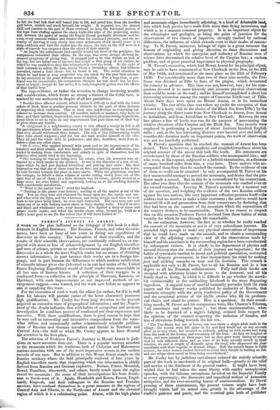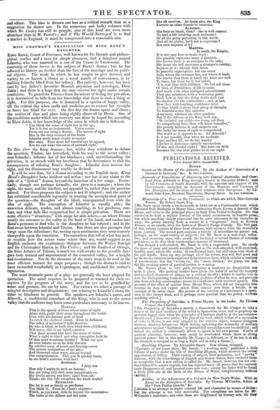PARROT'S JOURNEY TO ARARAT.
A WORK on the plan indicated on the titlepage of this book is a desi- deratum in English literature. The Russian, French, and other Govern- ments, have been as busy of late years in fitting out expeditions of discovery as this country. The narratives of their travellers, and the results of their scientific observations, are continually referred to, or em- ployed with more or less of acknowledgement by our English travellers and men of science, private or under Government auspices. But of their discoveries as a whole the mere English reader has no means of obtaining correct information ; in part because their works are in a foreign lan- guage, and in part because the diffuseness to which modern subdivision of scientific labour gives rise (adverted to in our last notice of the United States Exploring Expedition) would of itself render them unavailable to all but men of literary leisure. A collection of their voyages in a condensed form—a collection on the principle of Thevenot, Ramusio, or Hackluyt, with such improvements as our improved methods of ar- rangement suggest—was wanted, and the work now before us appears to aim at supplying this want. For the execution of such a work the editor (or author, for if it is well done his labours will partake rather of the latter character) possesses high qualifications. Mr. Cooley has from long devotion to the pursuit acquired an extensive store of geographical information; and his Negro- land of the Arabs indicates, that with habits of scrupulous and accurate investigation he combines powers of condensed yet clear expression and narrative. With these qualifications, there is good reason to hope that he may cull an interesting and instructive compendium from the some- what diffuse and occasionally rather ostentatiously scientific publica- tions of Russian and German travellers and literati in Northern and Central Asia—the field to which Mr. Cooley appears to have directed his attention in the first place.
The selection of Professor Parrot's Journey to Mount Ararat is judi- cious on more accounts than one. There is a popular interest attached to the mountain which the traditions both of Christian and Mahometan nations associate with one of the most impressive events in the earliest records of our race. But in addition to this, Mount Ararat stands on the frontier territory where the field principally explored of late years by English travellers meets that respecting which our information is chiefly derived from Russian and German explorers. Burnes, Fraser, Monteith, Brand, Hamilton, Ainsworth, and others, barely touch upon the region round the mountain : the scene of their investigations lies from South- east to North-west of it. Again, Humboldt and Rosen, Parrot, Engel- hardt, Klaproth, and their colleagues in the Russian and Prussian services, have confined themselves in a great measure to the regions of Central Asia and Siberia, to the North-east of Ararat and the elevated region of which it is a culminating point. Ararat, with the high plains and mountain-ridges immediately adjoining, is a kind of debateable land, into which both parties have made little more than flying incursions, and which is in a manner common property. It is an important object for the ethnologist and geologist, as being the point of junction for the - observations of two classes of inquirers, strongly marked by national differences, the influence of which extends even to their modes of reason- ing. To M. Parrot, moreover, belongs of right in a great measure the honour of originating and giving direction to these discussions and observations, by which the enterprise and industry of Russian men of science have determined the relative level of the Caspian Sea; a curious problem, and of great practical importance in physical geography.
M. Parrot's excursion, which had Mount Ararat for its principal object, may be said to have commenced at New Cherkask on the Don, on the 22d of May 1829, and terminated at the same place on the 25th of February 1830. For considerably more than two of these nine months, the Pro- fessor was detained at Tiflis by fears of the plague, which devastated the country in advance. This time was not, however, lost ; for his com- panions devoted it to more leisurely and accurate physical observations than could be made on the road ; and he himself accomplished a short but interesting excursion among the ranges of Caucasus North-east of Tiflis. About forty days were spent on Mount Ararat, or in its immediate vicinity. The rest of the time was taken np (with the exception of that devoted to a hasty visit to the shores of the Black Sea from Tiflis) by the journey along the direct route from New Cherkask to Ararat, from Ararat to Astrakhan, and from Astrakhan to New Cherkask. Between the two last places a line of levels was run for the purpose of ascertaining the relative elevations of the Caspian and the Black Sea. Nine months were employed in performing a journey of about fourteen hundred English milesand, as the less interesting districts were hurried over and halts of considerable duration made on important points, the work of observation was not too hurriedly performed.
M. Parrot's assertion that he reached the summit of Ararat has been
denied. There is, however, a simplicity and straightforwardness about his original account of the ascent that look like truth. His statements are corroborated by those of the Russian soldiers who accompanied him ; and who were, at his request, subjected to a judicial examination, at a distance of many hundred miles from him, a year later. Three natives who ac- companied them deny that he reached the summit. To the evidence of one of them no credit can be attached : he only accompanied M. Parrot on his first unsuccessful attempt to ascend the mountain, and denies that the pro- fessor made a second. But in this he is contradicted by his countrymen, The other two deny that the summit of the mountain was reached even on . the second excursion. Leaving M. Parrot's assertion for a moment out of the question, and weighing the evidence of the two Russian soldiers against the two natives, this very important reflection presents itself—the soldiers had no motive to make a false statement ; the natives would have incurred and persecution from their countrymen by declaring that they had been on the summit of the mountain which the superstition of the country declares to be unattainable. There is no reason to suspect that on this occasion Professor Parrot deviated from those habits of strict veracity for which he was through life remarkable.
In our estimation, however, the fact as to whether he really reached the summit of the mountain or not is of very subordinate interest. He -
ascended high enough to make any physical observations of importance that he could have made on the summit, and to obtain a commanding view of the adjoining country : and all the observations made by himself and his associates in the surrounding region have been corroborated by subsequent visiters. It is chiefly in the department of physics and natural history that the results of their journey are important; for the habits of systematic caution in moral and political speculation, contracted under a despotic government, in time incapacitates the mind for making just and striking remarks on man and his destinies. This remark is applicable not only to M. Parrot, but to all his Russian and in a lees degree to all his Prussian collaborateurs. Fully half their books are occupied with adulatory hymns in prose to the Autocrat, and all his family dead or living, in which it is difficult to say whether the mawk- ish sentimentality or the unblushing falsehood is the more disgusting ingredient. A sugared tone of morbid humanity pervades both the state papers and the literary works published by authority of Russia, that contrasts strangely with the stern vindictive policy of the Government and the occasional actions of the idyllic swains who fill its professo- rial chairs and chant its praises. Here is a specimen. In their moral- izing moods, M. Parrot and his companions were, like Chancer's Prioress,• • "all conscience and tendre haste' ; but these sentimentalists, when likely to be deprived of a night's lodging, evinced little respect for the opinions of the country respecting the seclusion of females, and less of chivalrous feeling towards the fair sex.
" The Yus-Bassa was not at home, nor was there a single adult male in the i village: the women were left alone in it; and they would not on any account allow us to stay there, but assailed us violently, pelting us with stones and dung from the roofs of the houses, and screaming all the time. At first we laughed at them, and were amused at their rage; but as they grew more daring on seeing that we only ridiculed them, and as some of us were actually struck by their missiles, we wit a couple of Kossaks upon the roof, who dispersed the four assailants with their regaiks or Kossak whips. Now the tumult began in right earnest; for other women rushed forward to assist their friends in turning us out, and our whips alone saved us from being overwhelmed."
Mr. Cooley has by judicious curtailment reduced the strictly scientific part of the work to one-fourth of its original bulk—greatly to the relief and nowise to the detriment of the general reader. It might have been wished that he had taken the same liberty with sundry metaphysical episodes, with the fulsome encomiums lavished on the Imperial Family at every opportunity, the discursive and superficial notices of Armenian antiquities, and the ever-recurring bursts of sentimentalism. By liberal pruning of these excrescences, the present volume might have been brought within half its actual size, greatly to the advantage of the reader's patience and purse, and the eventual gain both of publisher and editor. This hint is thrown out less as a critical remark than as a suggestion for future use. In the numerous and bulky volumes with which Mr. Cooley has still to grapple, sins of this kind are even more abundant than in M. Parrot's ; and if The World Surveyed is to find a market in England, it must be compressed into a reasonable size.



























 Previous page
Previous page